Trainees do a lot around ICORD: mostly they they do their own research and work on projects with their supervisors, but they also find time for many other responsibilities. A dedicated group of trainees forms the ICORD Trainee Committee which organizes a variety of research-related and social activities throughout the year. We asked trainees to tell us all about themselves, and their answers are pretty interesting!
Our survey ran from July 25th to August 4th, 2014. 27% of all ICORD trainees responded, which is pretty good considering the time of year. We used the UBC survey tool VoviciEFM.
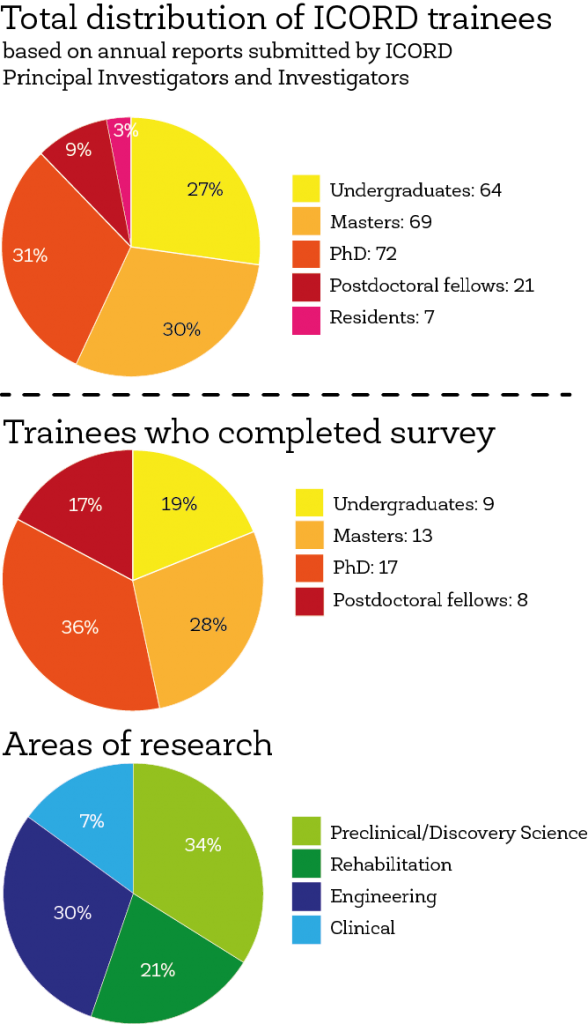 |
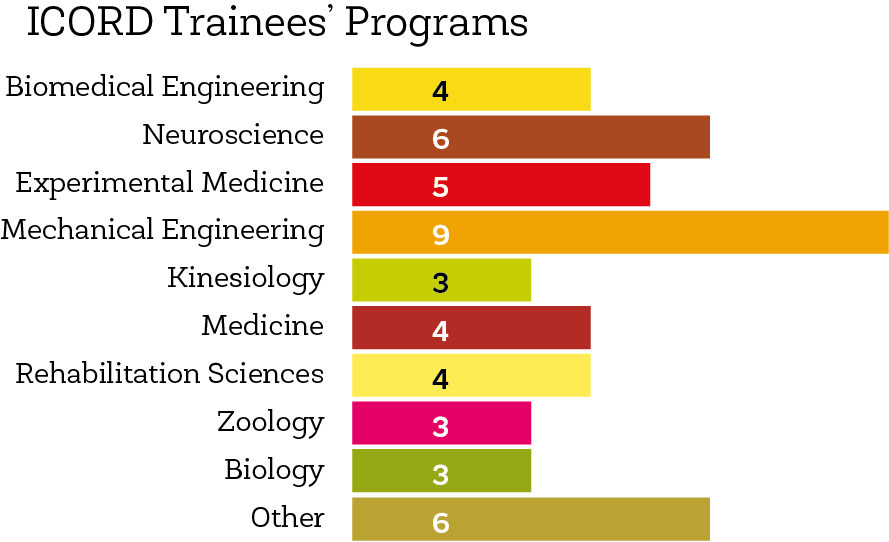 |
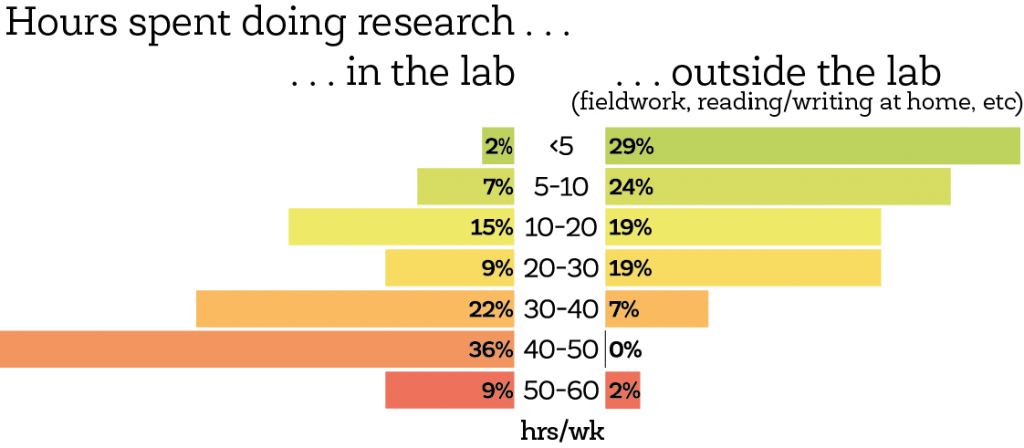 |
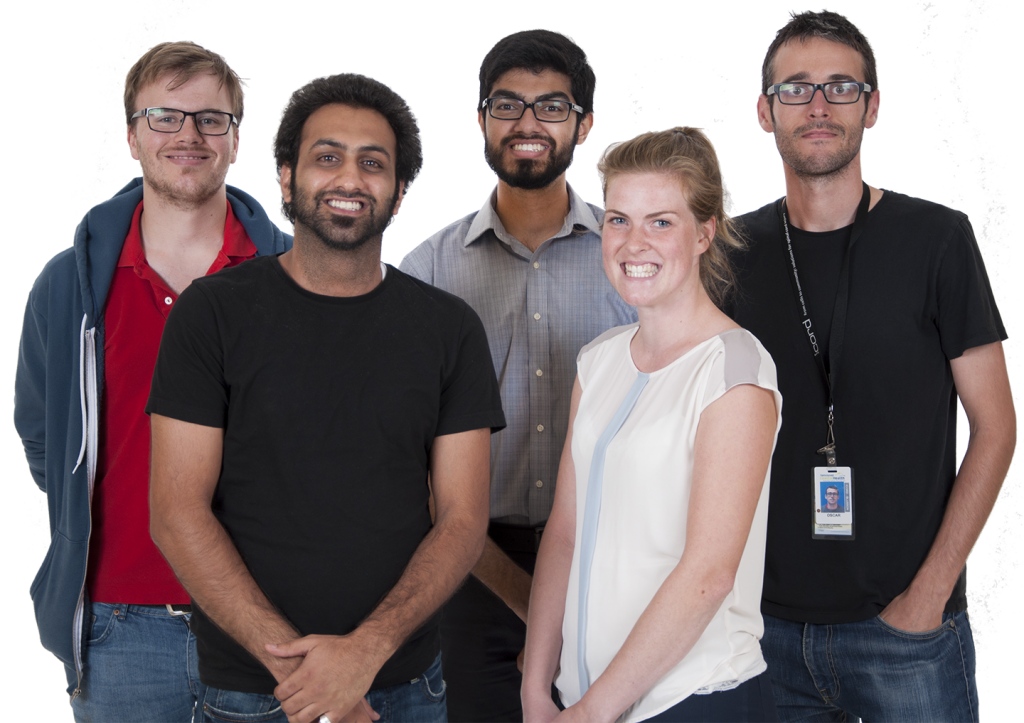 |
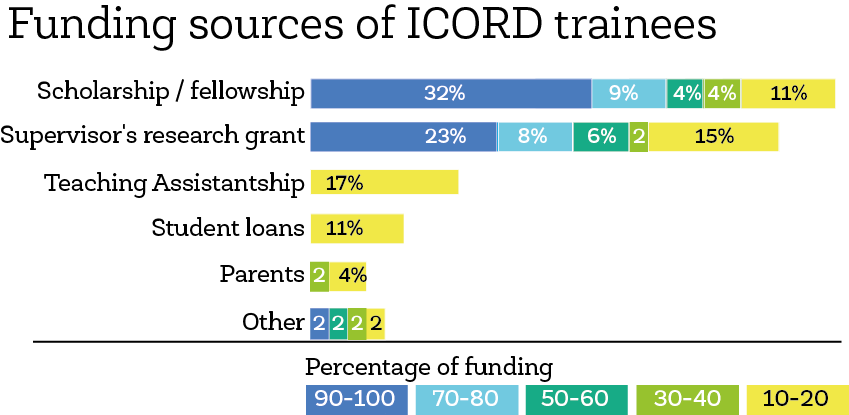 |
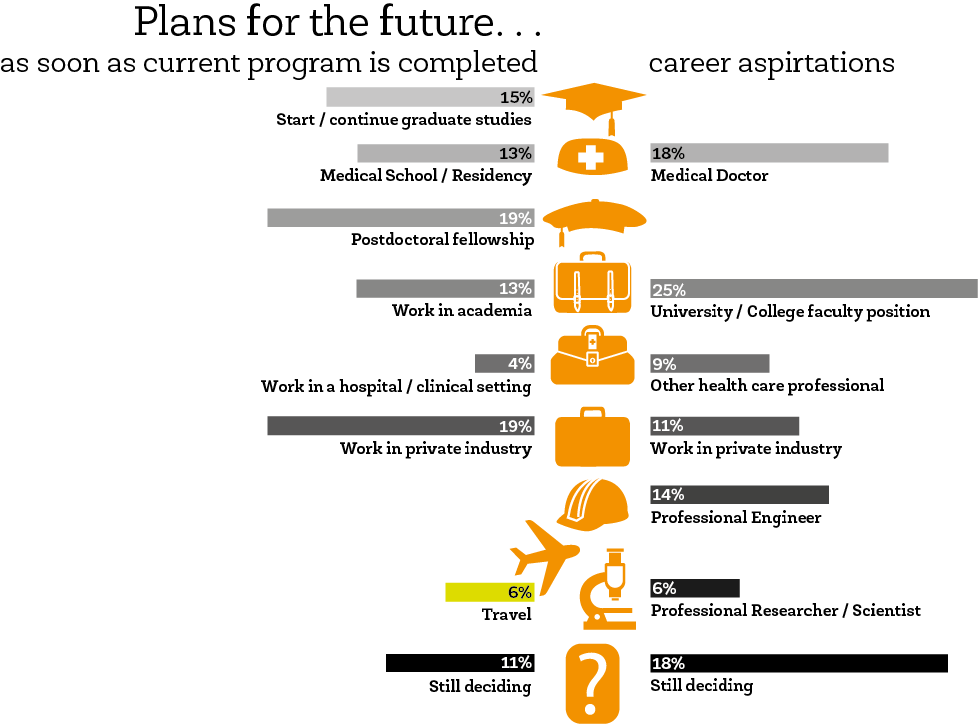 |
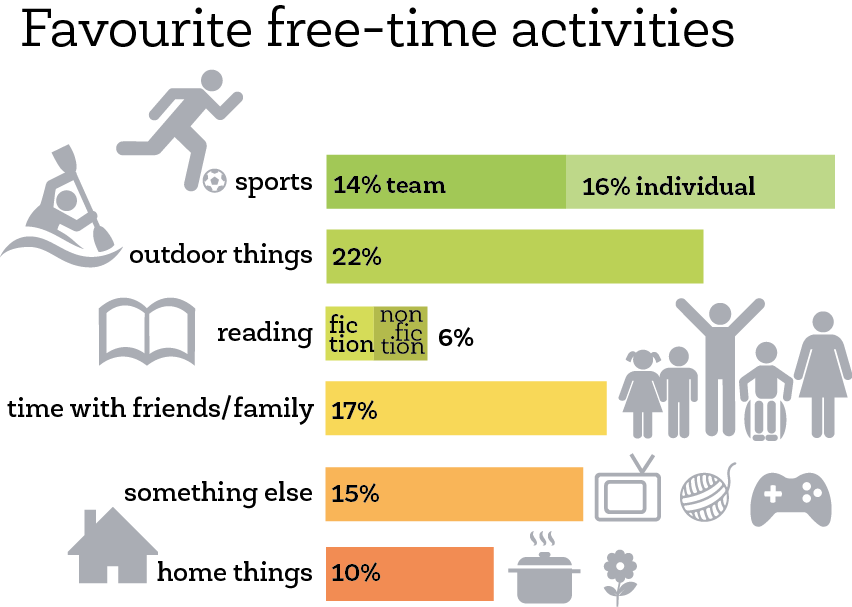 |
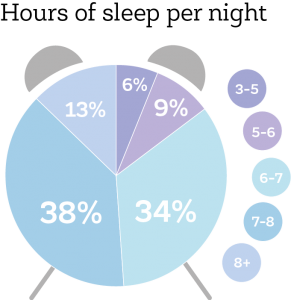 |
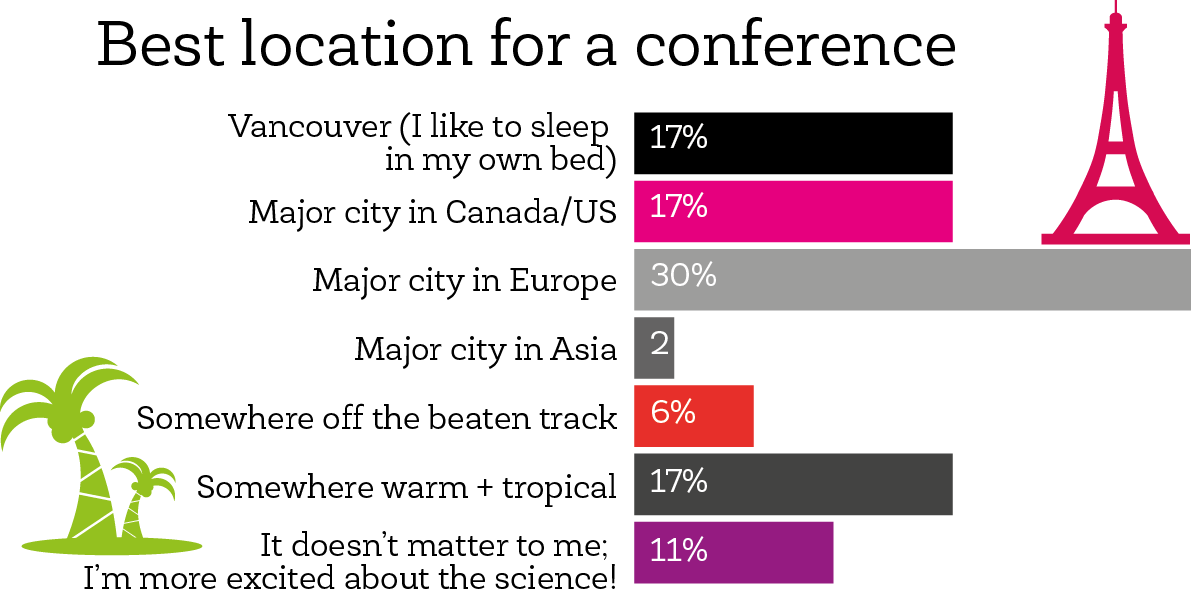 |
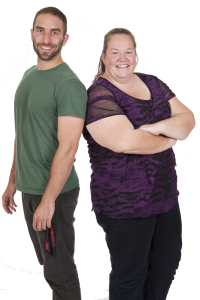 What do you like best about being an ICORD Trainee?
What do you like best about being an ICORD Trainee?
- The sense of community here
- Meeting lots of people with a variety of backgrounds.
- I love being in the ICORD building! It is such a warm environment (minus the overly cool air conditioning).
- Travel Awards
- Support from my peers
- Working with a great team
- Nice facility
- Exposure to multi-disciplinary research
- Meeting people with similar research interests
- The interesting talks, social gatherings, people
- Resources available, especially lectures and presentations
- Many opportunities to socialize with other trainees, present research, hear about new research.
- The great group of people working here.
- The atmosphere!
- Gathering research experience and focusing in depth of a specific area of study. I also enjoy working with an enthusiastic team of other undergraduates and the supportive supervisors.
- It’s so big, people don’t notice that I spend more time working on campus than I do at ICORD
- The people.
- The building, the people, feeling a part of something bigger than my own lab, the coffee on floor 3
- ICORD has a really good facilities for working and the groups have higher prestige in our field. Also, the staff and the people are awesome.
- Lots of opportunity for community, collaboration and continued education.
- Great community, with lots of opportunities to present and listen to research.
- Finally getting the chance to apply in-class knowledge to a research setting, lab environment/people, solving a challenging and previously unknown problem
- The building
- The collaborative and interdisciplinary environment
- ICORD is a great atmosphere for trainees. It is comprised of a great group of trainees, with really supportive staff and faculty.
- The other trainees – it’s a rich environment filled with enthusiastic and hard working students.
- I love what ICORD represents and its goals. I fully support this type of research.
- The atmosphere
- It is a valuable experience for my long-term goal (MOT). I like working with research participants. I like learning about all the measures that are commonly used in rehab research.
- Learning and the people!
- The exciting research in which I can take a part in.
- The lab community
- The great working environment.
- The community.
- The building and it’s instruments and Dr. Tetzlaff.
- I can have experimental work.
- Have the opportunity to get research training in high standard and knowledge of clinical trial about SCI from ICORD
- Great building, lots of opportunities to collaborate, fun events, funding for conference travel.
- Lovely building
- Friendly academic environment
What’s your biggest challenge as an ICORD Trainee?
- Not being on campus to access resources there
- Maintaining a work/life balance and budgeting.
- Thirty minute bus ride every day to and fro.
- Project scope, and expectations are often very high
- Getting enough research participants
- Not feeling like we have any student benefits because we’re so far from UBC
- I work at UBC campus, and it’s hard to make it out to ICORD events.
- Meeting people outside of the lab environment
- Trying to remember everyone’s name, research lab, etc.
- Sometimes I feel like we are really spread out and we don’t see each other much.
- Meeting deadlines and commuting to work
- Communication with supervisors.
- Getting in the research mindset i.e. Finding the problems as well as the solutions
- Lack of funding.
- Sometimes it’s a little tricky being isolated from the rest of UBC especially when there aren’t always a lot of professors around to get help/advice from.
- Trying to prove yourself!
- Knowing what to do next.
- Catching up on all the biochemistry that we didn’t learn in our mechanical engineering undergrad degrees.
- Finding new friends and having collaboration with other labs.
- Sometimes there are too many things that you are expected to participate in or attend.
Some trainees took “challenge” in a different way:
- Winning the poster competition at the annual research meeting.
- To be successful in my research, publishing good data that can help to develop the knowledge in SCI.
- Performing as well as some of the PhD students.
What is one piece of advice you wish you had received before starting graduate studies?
- Grad school is not like ‘Getting paid to go to school’!
- Make sure that you love it
- How to most efficiently plan your schedule.
- Take time off to travel before your postdoc
- Talk to senior grad students about potential career opportunities
- Don’t.
- For MSc students: gather your committee in the first month.
- Learn more about the funding opportunities before starting the program
- Apply for fellowship funding! If successful, you make way more money that you do through departmental funding
- Make sure you have a timeline to keep you accountable
- Everyone’s graduate studies experience is VERY different – so don’t base going to grad school choice on other people’s opinions.
- Talk to past student and actually listen to what they tell you.
- It’s okay to say no
- Make a plan right from the beginning.
- There is a lot of failing on the road to success. Most of time in research is spent troubleshooting, so you have to like the process more than the end result.
- Take ownership over your degree. It’s yours, not your supervisor’s.
- There aren’t many jobs in academia, so do a PhD if you’re ok with not actually working in the area. Also, ensure you are in a position where there is livable funding for you for the first 4 years of your degree.
- It’s going to be hard (and it’s supposed to be hard, it will mean more that way) but don’t let the hard get in your way of getting things done!
- Invest in your brain whenever, wherever you can and as soon as you could
- Grad school can feel very isolating because of how independent projects are.
- Find out what kind of person your supervisor is. It can be the difference between a horrible or great experience. I’ve had both.
- Be careful about the project you chose or is given to you. You should like it and some how have good feeling about it and to some extent be sure that this might make a difference.
- Work hard on building your CV and networking!
- Time spent at work does not lead to more productivity, functional time does; at work, or any other location. 40 hours a week of functional time are needed for success.
- Don’t give up!

